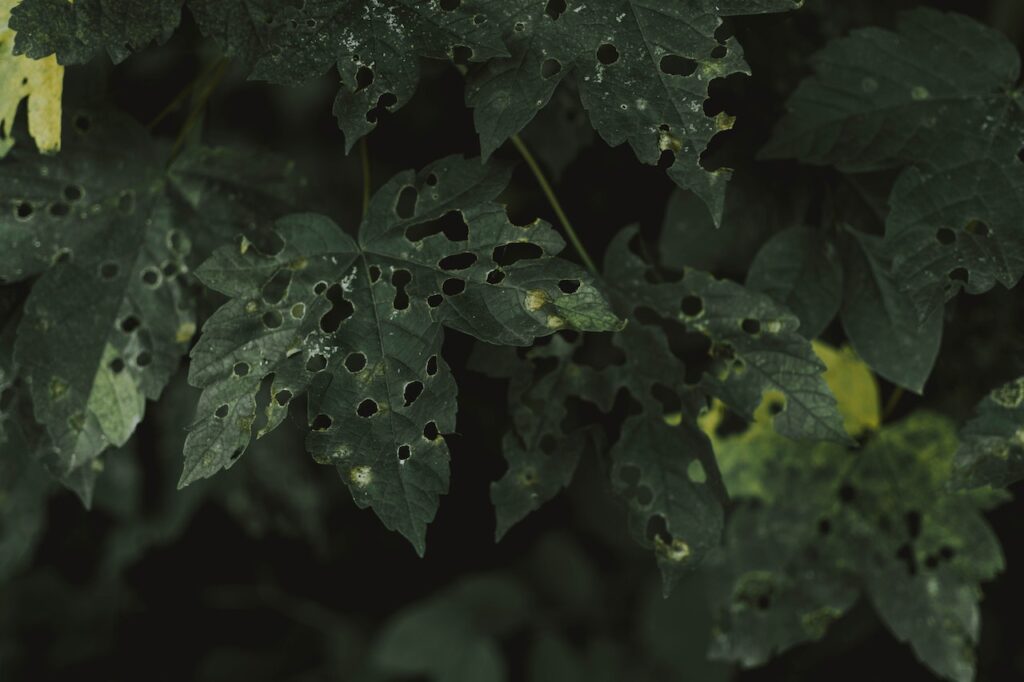
In the vibrant world of gardening, the satisfaction of nurturing plants to flourish is often accompanied by the persistent presence of garden pests. These uninvited visitors can ravage your beloved greenery, leaving gardeners in search of effective solutions. In this comprehensive guide, we’ll explore ten of the most common garden pests that you’re likely to encounter and provide practical, eco-friendly strategies for dealing with them. From tiny sap-sucking aphids to voracious Japanese beetles and tunneling moles, we’ll arm you with the knowledge and techniques you need to protect your garden and cultivate a thriving, pest-resistant oasis. Whether you’re a seasoned horticulturist or a budding green thumb, these solutions will help you maintain the health and beauty of your garden while respecting the delicate balance of nature.
Aphids:
Aphids are tiny, sap-sucking insects that can quickly multiply and damage your garden plants. To deal with them, start by giving your plants a strong spray of water, which can dislodge and remove the pests. You can also introduce natural predators like ladybugs and lacewings, which feed on aphids. For a more targeted approach, consider using neem oil or insecticidal soap as these substances can effectively control aphid populations without harming your plants or the environment.
Slugs and Snails:
Slugs and snails are notorious for munching on tender plant leaves and causing unsightly damage. Combat them by setting up beer traps; they’re attracted to the beer and will drown in the liquid. You can also use copper barriers around your garden beds, as the pests receive a mild electric shock when they touch the copper. Alternatively, apply diatomaceous earth or iron phosphate-based slug baits as effective and eco-friendly control methods.
Whiteflies:
Whiteflies are small, sap-feeding insects that can weaken and damage plants. To address them, release parasitic wasps that are natural predators of whiteflies. Reflective mulch can deter them from settling on plants. If you need to take more direct action, consider using neem oil or insecticidal soap to reduce whitefly infestations without harming beneficial insects.
Caterpillars:
Caterpillars can devour leaves and cause significant harm to your plants. Handpicking them off your plants and destroying them is an effective method for small infestations. For larger areas, use floating row covers to protect your plants from caterpillars. If necessary, apply Bacillus thuringiensis (Bt), a biological insecticide that specifically targets caterpillars, to control their numbers.
Japanese Beetles:
Japanese beetles are voracious feeders that can defoliate plants. Handpick them during the early morning when they’re less active and drop them into a container with soapy water to dispose of them. Planting repellent companion plants like garlic and rue can help deter Japanese beetles. In cases of severe infestations, apply neem oil or pyrethrin-based insecticides, but be cautious about their impact on beneficial insects and the environment.
Deer:
Deer are notorious for nibbling on garden plants, which can be frustrating for gardeners. To deter deer, install fencing around your garden, preferably at least 8 feet high, as they can jump over lower barriers. Motion-activated sprinklers can startle and deter deer when they approach your garden. Planting deer-resistant species and using repellent sprays containing ingredients like capsaicin can also help protect your plants from these voracious herbivores.
Squirrels:
Squirrels can be a nuisance in the garden, often digging up plants and stealing produce. To keep them at bay, use squirrel-proof bird feeders to provide them with an alternative food source and distract them from your garden. Applying capsaicin-based repellent sprays on your plants can deter squirrels due to the spicy taste. If the problem persists, live traps can be used to safely capture and relocate squirrels to a more suitable location.
Spider Mites:
Spider mites are tiny arachnids that can wreak havoc on plant leaves by sucking out their juices, leaving behind stippled and discolored foliage. To control spider mites, increase the humidity in your garden because they thrive in dry conditions. Spray your plants with neem oil or insecticidal soap to eliminate spider mites. Additionally, you can introduce predatory mites, such as Phytoseiulus persimilis, which feed on spider mites, as a natural way to manage infestations.
Thrips:
Thrips are slender insects that feed on plant sap, causing damage to leaves and flowers. Use yellow sticky traps to monitor thrip populations and capture them. To control thrips, apply neem oil or insecticidal soap to your plants, making sure to cover both upper and lower leaf surfaces. If the infestation persists, consider introducing beneficial insects like predatory mites, which prey on thrips, as part of an integrated pest management approach.
Moles and Voles:
Moles and voles can be a headache for gardeners, tunneling and causing root damage to plants. Set up mole and vole traps to catch these burrowing pests. You can also use underground barriers made of wire mesh to protect the roots of your plants. Encourage natural predators like owls and snakes in your garden to help keep mole and vole populations in check and maintain a healthier garden ecosystem.


